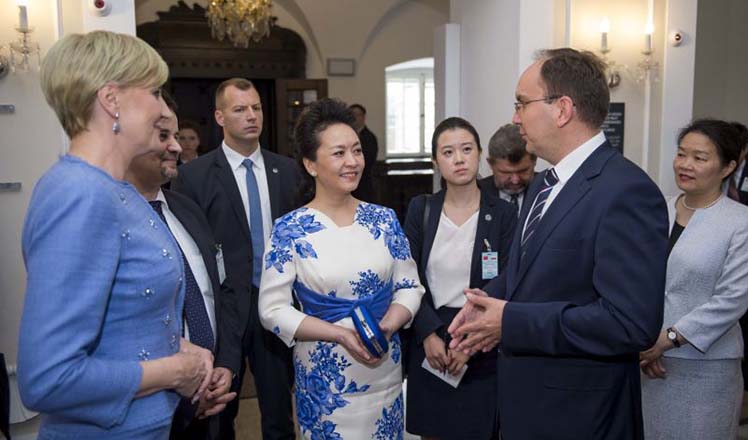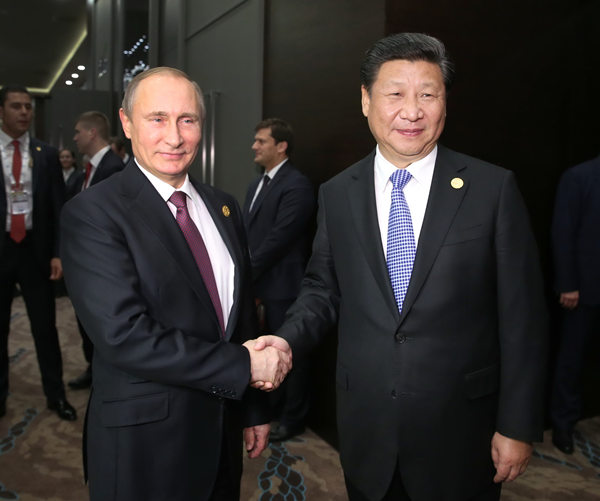China, Russia carry a world of hopes
Updated: 2016-06-24 08:20
By CHEN YURONG(China Daily)
|
||||||||
|
|
|
Chinese President Xi Jinping (R) meets with Russian President Vladimir Putin in Antalya, Turkey, Nov 15, 2015. [Photo/Xinhua] |
Russian President Vladimir Putin is scheduled to visit China on Saturday to hold in-depth talks with his Chinese counterpart Xi Jinping on bilateral ties. This will be his fourth visit to China since retaking office as president in 2012.
The two leaders will also discuss priority cooperation areas in the China-Russia comprehensive strategic partnership. Like their previous meetings, they are also expected to issue a number of key political documents and witness the signing of a series of agreements on cooperation between the two countries' departments and enterprises.
Cooperation in transportation and energy industries are likely to top their agenda, as Beijing is pressing ahead with the Belt and Road Initiative, aimed primarily at improving connectivity in Eurasia, and Moscow, a traditional oil exporter, needs some help to counter the declining oil prices over the past two years.
Despite the two countries being close trade partners and enjoying high-level political coordination for decades, they are yet to exploit the opportunities in many areas. That, to some extent, explains the frequent Sino-Russian leadership meetings in recent years. This time Xi and Putin are likely to expedite the implementation of previous deals and work out concrete plans for the new ones.
The 770-kilometer high-speed railway linking Moscow and Kazan in Russia, an ongoing joint venture between China and Russia, is likely to make fresh progress after Putin's visit. It is to be completed by 2018, that is, before Russia hosts the FIFA World Cup. And if it is extended to Beijing in the near future, train journey between the two countries capitals could be cut from nearly a week to two days.
Bilateral projects like this, which are many, will certainly add new impetus to the Silk Road Economic Belt, the inland part of the Belt and Road Initiative that stretches from East Asia to Europe.
This year marks the 15th anniversary of the China-Russia Good-Neighborly Treaty of Friendship and Cooperation, the legal foundation of their bilateral relationship, which features nonalignment, non-confrontation, and is not targeted at any third party. Thanks to their adherence to the three core principles, Beijing-Moscow ties have become an apt example of a new major-power relationship over the past decade or so.
Speaking a week ago at the International Economic Forum 2016 in St. Petersburg, Russia, Putin expressed high expectations of the Beijing-Moscow comprehensive strategic partnership, and proposed to establish a grand Eurasian partnership including China, India, and other regional powers in a show of good relationship.
But Beijing and Moscow will not seek a de facto alliance despite Russia supporting China in its territorial disputes with the Philippines in the South China Sea. Some senior Russian officials, such as Foreign Minister Sergei Lavrov, have emphasized that territorial issues should be settled through bilateral talks and peaceful negotiations. More importantly, the "non-interference" principle was adopted by the Shanghai Cooperation Organization members, including China and Russia, years ago and has helped resolve the border issue between China and Kazakhstan.
Should Putin reiterate the importance of non-interference in bilateral matters during his visit to China, which he is likely to do, it will serve as a much-needed move to back a nonaligned partner in safeguarding its core legal interests.
The author is a senior researcher in European and Asian studies at the China Institute of International Studies. The article is an excerpt from her interview with China Daily's Cui Shoufeng.
- US Ambassador to China Baucus says he is a 'WeChat nut'
- Classes inspired by ancient arts offer moral teachings
- School's artificial grass found to be highly toxic
- Agency lists tiny hallway for sale: 1.5 million yuan
- Armed police mend gap in E China river defenses
- Over 90% Chinese netizens access news on mobile phones: report
- US urged not to rock the boat by flexing its muscles
- UK's EU referendum polls show 'Leave', 'Remain' tied up
- DPRK yet to confirm suspected missile launches
- Chinese panda expert concerned by sick panda in US
- British MPs pay tribute to murdered MP Jo Cox
- DPRK deploys Musudan ballistic missile in east coast
 Rising above the clouds: Mist envelops Qingdao
Rising above the clouds: Mist envelops Qingdao
 In pictures: Countdown to Brexit referendum
In pictures: Countdown to Brexit referendum
 Top 10 classic Walt Disney animated films
Top 10 classic Walt Disney animated films
 Top 10 overseas M&As of Chinese auto companies
Top 10 overseas M&As of Chinese auto companies
 Now and then: Famous venues of the Long March
Now and then: Famous venues of the Long March
 Things you may not know about Summer Solstice
Things you may not know about Summer Solstice
 First lady visits Fryderyk Chopin Museum in Poland
First lady visits Fryderyk Chopin Museum in Poland
 Chinese factories score a goal with Euro 2016
Chinese factories score a goal with Euro 2016
Most Viewed
Editor's Picks

|

|

|

|

|

|
Today's Top News
Abe's blame game reveals his policies failing to get results
Ending wildlife trafficking must be policy priority in Asia
Effects of supply-side reform take time to be seen
Chinese State Councilor Yang Jiechi to meet Kerry
Chinese stocks surge on back of MSCI rumors
Liang avoids jail in shooting death
China's finance minister addresses ratings downgrade
Duke alumni visit Chinese Embassy
US Weekly

|

|








